Manitoba premier apologizes to men switched at birth in hospital for 'terrible mistake'
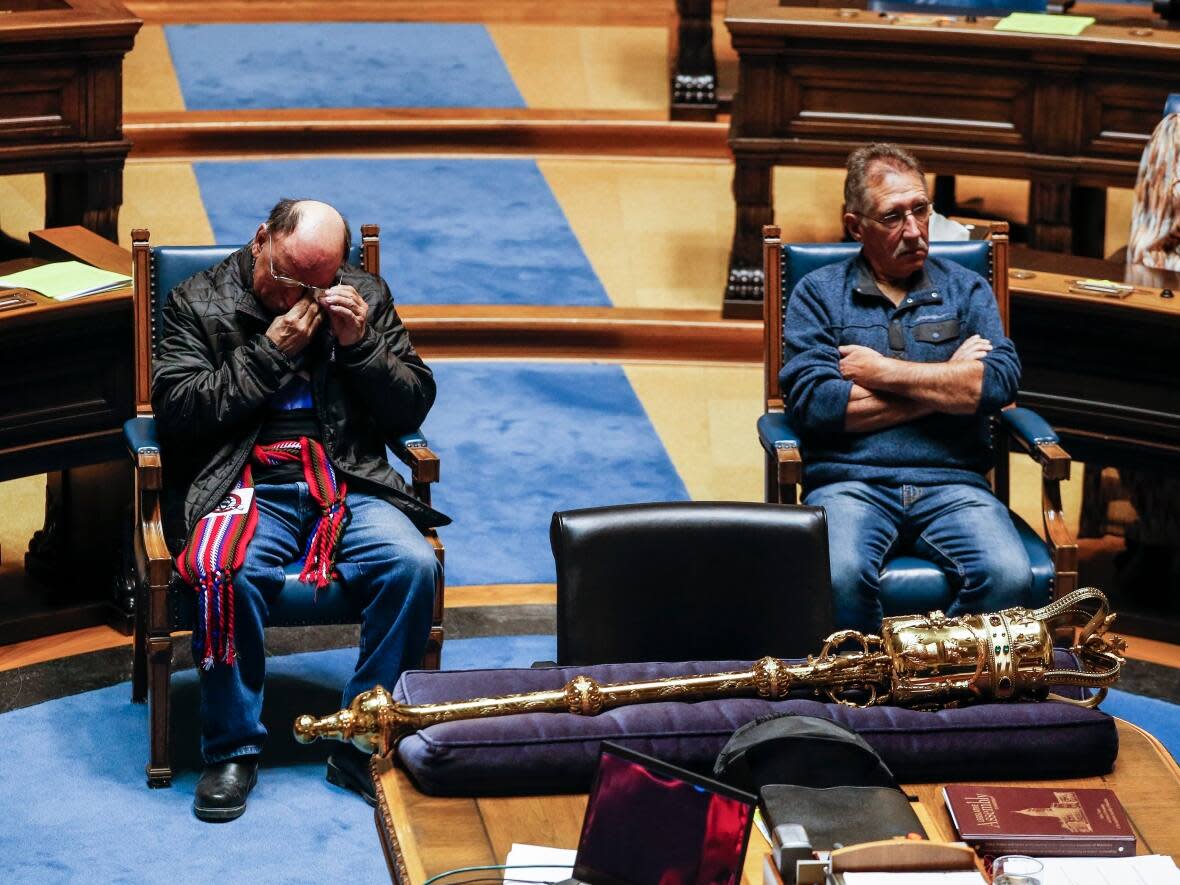
Two men who were sent to wrong homes after their births at a hospital in 1955 say they're happy with what they believe is a sincere apology made to them by Manitoba's premier on Thursday.
Premier Wab Kinew stood in the Manitoba Legislative Assembly to formally apologized to Edward Ambrose and Richard Beauvais for the mistake that led to them being raised by each other's families.
"I rise today to deliver an apology that has been a long time coming, for actions that harmed two children, two sets of parents and two families across many generations," Kinew said.
"We sincerely apologize for our failure to care for you, to protect you, to ensure that you would grow up with the love of the families who welcomed you into this world."
The two men, who were both born at an Arborg, Man., hospital on June 28, 1955, sat in the House as they received the apology their lawyer first requested in April 2022.
Ambrose is Métis but grew up believing he was Ukrainian; Beauvais is Ukrainian, Jewish and Polish, but always thought he was Métis.
The mistake wasn't discovered until recently, and both have said the shocking discovery has been difficult to handle.
WATCH | Premier apologizes in Manitoba Legislature to men switched at birth:
"We are sometimes asked to understand empathy and compassion by considering what it's like to walk a mile in another person's shoes," Kinew said at the start of his speech.
"Our honoured guests here today will perhaps understand compassion and empathy on a level that very few of us will ever be able to approach."
Men happy with apology
Beauvais said he's not big on apologies, but felt the premier was sincere in his words. He felt very good about talking to Kinew in person, he said.
Ambrose also said he was happy with the apology, that it was touching and what he was looking for.
Although the mistake was discovered last year, the two men met face to face for the first time just this week.
"It's emotional … meeting someone who is you — but I am him," Ambrose said following Kinew's apology.
"It was a great feeling of meeting someone, even [though] we were switched at birth, but to see them in person and meet with the family, it was an honour to see somebody that's part of you."
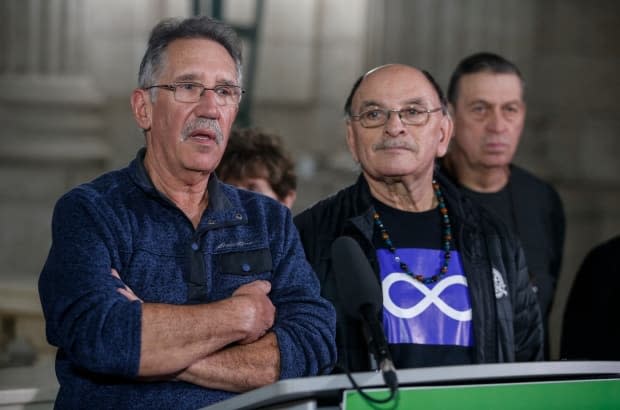
Beauvais joked the two wondered who was older, but that because Ambrose is balding, it had to be him.
"I could have other things to say," Ambrose quipped to a chorus of laughs from family members.
Beauvais's youngest daughter, Taryn, fought back tears as she spoke about how special the recent meeting of the two families has been for everyone.
"It's interesting to meet people who technically, you're not blood related to, but you instantly become family with," she said.
She called it a sort of "beautiful blending of families," saying everyone in the families "has the biggest heart."
"No one is losing anything by this, but our family's just expanding and growing," she said.
"We're just looking forward to the future and getting to know each other even more, and have more cousins and more aunties and more brothers and more sisters than we used to."
Apology in 'spirit of healing and reconciliation': Kinew
Kinew, who met with the men before the apology, laid out some of the facts of their lives.
Both of Ambrose's parents died by the time he was 12, and Beauvais was taken from his home and lived with foster families, too, Kinew said.
He also outlined coincidences that cropped up during their lives.
Ambrose once asked his biological sister — who he didn't know was his sister at the time — to play on his baseball team at recess as a child, Kinew said. He also lived just a few blocks away from his biological sister in Winnipeg.
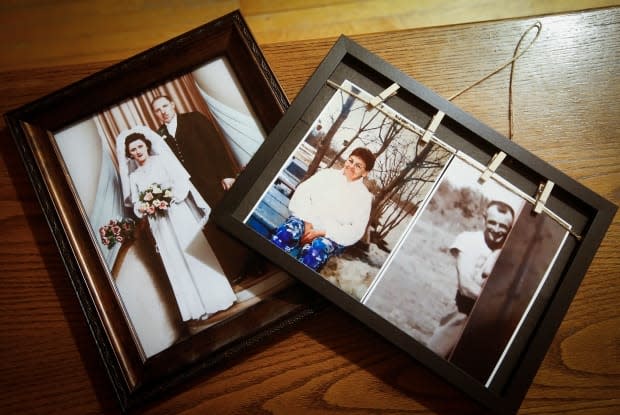
Beauvais once fished next to his own biological sister on a shoreline in B.C., and another time stopped for a drink at a bar she worked at.
"Both men have parents that they've never met, family members they forever lost the opportunity to forge relationships with," Kinew said.
"Both men are embracing the old but also building something new for themselves and for their families."
Kinew also noted that since the mistake was discovered, Ambrose has obtained Manitoba Métis Federation citizenship. He's learning to bead and takes his grandson to powwows, said Kinew.
Beauvais has discovered that he was the only white man on what he believed was his all-Indigenous fishing crew in B.C., but he's making new connections with his birth family, and his daughter now has tattoos with the name "Ambrose."
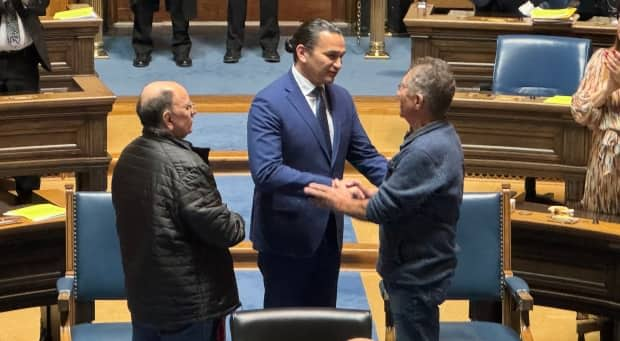
The two men were also allowed to sit among MLAs on the floor of the legislature — a rare occurrence, but one with some precedent, Kinew said.
He noted that while the situations are different, when prime minister Stephen Harper apologized to residential school survivors, Indigenous representatives sat on the floor of the chamber on Parliament Hill in Ottawa.
"The idea that you use the seat of democracy to make something right for the people who've been failed by our government, I think, is an important symbolic gesture that adds some weight to the words of apology," he said.
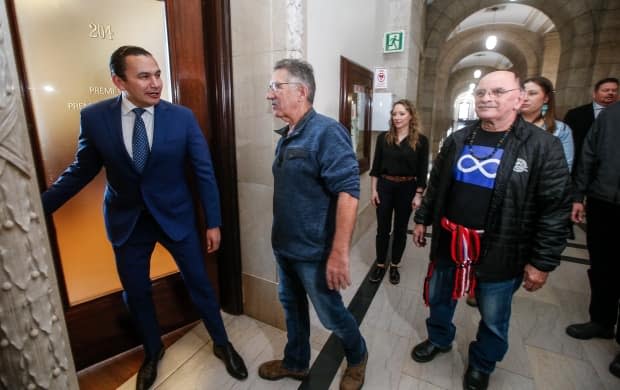
The premier said Thursday's apology was offered "in a spirit of healing and reconciliation."
"A great Manitoban, Justice Murray Sinclair, has said that the need for reconciliation has often arisen in our country's history when we have denied children the ability to answer four basic questions: who am I, where do I come from, why am I here, where am I going," Kinew said, referring to the former senator and chair of the Truth and Reconciliation Commission.
"The province of Manitoba made a terrible mistake that stood in the way of you being able to answer these questions for many, many years."


